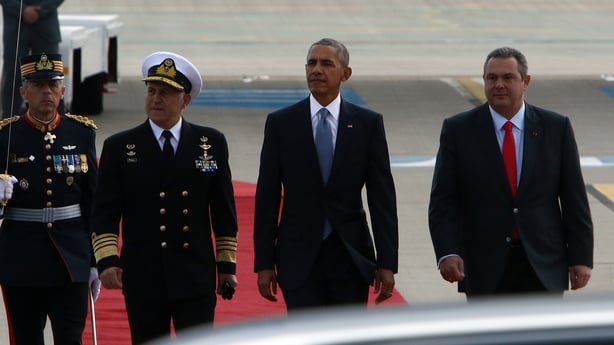A strong and unified Europe is "good" for the United States and NATO is "absolutely vital" for US security and prosperity, US President Barack Obama said as he launched his final European trip.
The US president this morning arrived in Greece, where he is holding talks with the country's leaders.
"We believe a strong, prosperous and unified Europe is not only good for the people of Europe but good for the world, and good for the United States," he told Greek President Prokopis Pavlopoulos in Athens.
He added that the trans-Atlantic relationship is "the cornerstone of our mutual security as well as prosperity".
Mr Obama will seek to calm the nerves of allies concerned by Donald Trump's shock presidential election victory, especially as the US President-elect has downplayed the importance of the NATO military alliance.
Mr Obama stressed that NATO "is something that provides significant continuity even as we see a transition of government in the United States".
"Across Democratic and Republican administrations there is a recognition that the NATO alliance is absolutely vital," he said.

Security is tight in central Athens, with thousands of police officers on the streets and traffic cut off for several hours.
Civil servants, communists, far-left groups and anarchists all planned demonstrations for Mr Obama's visit to the Greek capital.
Mr Obama later heads to Germany for key discussions with German Chancellor Angela Merkel, long one of his closest foreign partners.
He will also meet there with French President Francois Hollande, British Prime Minister Theresa May and Italian Prime Minister Matteo Renzi.
The leaders plan to discuss the crises in Syria and Ukraine, as well as the fight against the so-called Islamic State militant group.
In a pre-trip news conference, Mr Obama told reporters he would "signal our solidarity with our closest allies and express our support for a strong, integrated and united Europe".
"It's essential to our national security and it's essential to global stability," he said.
"That's why the trans-Atlantic alliance and the NATO alliance have endured for decades under Democratic and Republican administrations," he added, seeking to allay fears that the US President-elect will seek to sideline the alliance.
Mr Obama also said he believes his successor has a "commitment to NATO".
He will conclude his trip with a stop in Peru for a summit of the Asia-Pacific Economic Co-operation forum (APEC).
Among the leaders he is expected to meet there is President Xi Jinping of China.
"This is a time of great change in the world, but America's always been a pillar of strength and a beacon of hope to peoples around the globe. And that's what it must continue to be," Mr Obama said.

